Daniel R Simmons and Becca Jones-Albertus, then Deputy Director of the Solar Energy Technologies Office, present the winners of the American-Made Solar Prize Round 1 with $500,000 checks in September 2019.
One of the ways we are working to continue to drive innovation in the solar technologies is through prizes like the American-Made Challenges.
Prize challenges are tools that can help inspire the next generation of American innovators to help solve some of our most pressing energy issues. Launched in January 2018, EERE’s American-Made Challenges incentivizes entrepreneurs to reduce barriers to improve manufacturing scale.
This past September, I had the pleasure of attending Solar Power International in Salt Lake City, where we announced the first-round winners of the American-Made Solar Prize —a competition designed to advance solar innovations from idea to the manufacturing floor. A panel expert judges selected two winners, Phase3 Photovoltaics and Solar Inventions, from a pool of 160 teams. Each received a grand prize of $500,000 after spending a year of hard work developing their products.
Strengthening Critical Connections
One important element of the American-Made Challenges is the American-Made Network. This network provides entrepreneurs with connections to help them succeed. The Network is a collective made up of more than 100 technology incubators and accelerators, venture capital firms, angel investors, and industry representatives. Energy entrepreneurs can tap in to the industry expertise and resources across the Network to help accelerate the development and commercialization of their new ideas and products.
One example is Phase3 Photovoltaics. During the competition, the team was focused on integrating solar into factory-built homes to help low- and middle-income customers. The team used its initial $50,000 to refine its idea, travel, and reach out to clients to identify their concerns. What they learned was that clients were most concerned about transporting the product. By working with the American-Made Network, the team developed a prototype of a solar home that they towed behind a truck over various road and weather conditions. This allowed them to collect experimental data for the home builders about how well the home with solar panels traveled, and enabled them to develop solutions, address additional concerns, and assign a value to their product. As a next step, the Phase3 Photovoltaics team will access the Network for help with stress testing and financial modeling. They hope to begin pilot-testing with major home-builder partners this year.
In the future, we hope to make the American-Made Network available to all EERE awardees in order to better connect our projects and support the growth of American industry.
Innovation through Competition

Daniel R Simmons meets with the Phase3 Photovoltaics team, winners of the American-Made Solar Prize Round 1 in September 2019.
Over the past year, EERE announced two more Solar Prize Rounds and six additional prizes from across four EERE’s Technologies Offices.
The American-Made Challenges help foster public-private sector collaboration and spur American manufacturing through innovation and competition. These prizes and challenges help incentivize increased innovation in American manufacturing by developing solutions that can improve the quality of life for Americans now and in the future.
- Waves to Water Prize, which seeks projects that demonstrate small, modular, cost-competitive desalination systems that use the power of ocean waves to provide clean drinking water for disaster recovery and for remote and coastal communities;
- Solar Desalination Prize, which incentivizes the acceleration of development of low-cost desalination systems that use solar-thermal power to produce usable water from salt water;
- Lithium-Ion Battery Recycling Prize, which works to identify innovative solutions for collecting, sorting, storing, and transporting spent and discarded lithium-ion batteries—from electric vehicles, consumer electronics, industrial, and stationary applications—for eventual recycling and materials recovery;
- ITEAM Prize, which is designed to identify and attract attention to a wide range of ideas and practices that are driving measurable energy savings at U.S. manufacturing plants to stimulate innovation at other facilities;
- Powering the Blue Economy™: Ocean Observing Prize, which encourages the development of new energy solutions that meet the needs of ocean researchers, agencies, explorers, and other end users that operate ocean-observing technologies; and
- FAST Commissioning for Pumped-Storage Hydropower, which works to reduce the time, cost, and risk from concept to commissioning, excluding permitting, for pumped-storage hydropower.
The American-Made Challenges help foster public-private sector collaboration and spur American manufacturing through innovation and competition. These prizes and challenges help incentivize increased innovation in American manufacturing by developing solutions that can improve the quality of life for Americans now and in the future.
